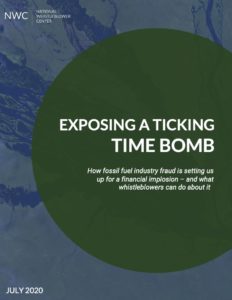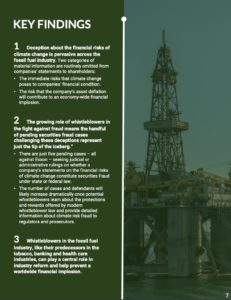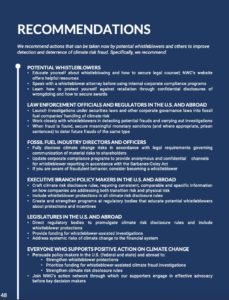To predict the conditions that lead to a high risk of fraud, anti-fraud professionals and researchers frequently rely on a concept called the “fraud triangle,” a model for understanding three conditions that lead to fraud: opportunity, motivation (which can take the form of incentives or pressure), and the ability to rationalize fraud. When companies face financial pressure, the potential for fraudulent behavior is particularly acute. Data from EY’s 2016 Global Fraud Survey shows that, in the oil, gas and mining industry, 43% of employees would engage in fraud to meet financial targets and 35% would engage in fraud to help a business survive a downturn.
As the world moves towards a low-carbon economy, trillions of dollars in oil and gas investments will begin to lose their value. According to analysis from the think tank Carbon Tracker, global proved reserves of fossil fuels significantly exceed that which can be burned to stay within Paris limits and oil and gas assets risk becoming “stranded assets.” Even without additional climate policy, competition from renewable energy and changing demand alone could lead to significant impairments for major oil and gas assets. Despite these risks, most large oil and gas companies have continued to incentivize executives to spend trillions on exploration and development, approving projects incompatible with a low-carbon economy. Without credible plans for a transition to a low-carbon business or even realistic emissions targets, many oil and gas companies remain unprepared for the energy transition.
Declining demand, investor pressure, excess supply, and competition from renewable energy will put intense financial pressure on executives to prove that the industry still has a viable investment thesis. While the industry has promoted a narrative of plastic demand growth and carbon capture innovation to justify the industry’s expansion, these narratives have set expectations that appear increasingly unrealistic and misleading. If companies do not prepare quickly, executives will increasingly face pressure to cover for struggling performance or risky choices, creating conditions ripe for financial fraud.
The lack of mandatory climate risk disclosure requirements, a weak auditing industry, and permissive regulations for reporting reserves could provide ample opportunities for companies to respond to pressure by cooking the books. The industry’s long history of deception on climate change, as well as other environmental dangers, suggests that the ability to rationalize fraud already exists within the industry. If companies turn to fraud, oil and gas whistleblowers could play a powerful role in detecting and helping to prosecute fraud.
The growing threat of climate risk disclosure fraud
A 2018 Government Accountability Office report found that “[i]mpacts from a changing climate can pose serious risks to the global economy and affect many economic sectors” and that “SEC reviewers may not have access to the detailed information that companies use to arrive at their determination of whether risks, including climate-related risks, must be disclosed in their SEC filings.” The SEC issued interpretative guidance in 2010 to public companies about addressing the effects of climate change.
However, as the Congressional Research Service has noted, many stakeholders, regulators, and companies believe that the SEC and other regulators must take significant additional action to ensure that climate-related risks are fully addressed in companies’ disclosures. These concerns are particularly justified considering the billions of dollars at risk due to the so-called carbon bubble. Research shows that bubbles frequently coincide with epidemics of securities fraud.
In July 2020, NWC released a report detailing widespread deception by fossil fuel executives regarding the financial risks of climate change. The report describes why deception about companies’ preparedness for climate change risks represents a ticking time bomb that, if not addressed, could contribute to worldwide economic devastation. This is where whistleblowers come in.
The report, entitled Exposing a Ticking Time Bomb: How Fossil Fuel Industry Fraud is Setting Us Up for a Financial Implosion – and What Whistleblowers Can Do About It, calls for collaborative investigations by whistleblowers and law enforcement authorities of likely securities fraud violations.
It found that deception about the financial risks of climate change is pervasive across the fossil fuel industry, with two categories of material information routinely omitted from companies’ statements to shareholders: (1) the immediate risks that climate change poses to companies’ financial condition, and (2) the risk that the company’s asset deflation will contribute to an economy -wide financial implosion.
- Exposing a Ticking Time Bomb
- Key Findings
- Recommendations
“In light of the deceptions we found, the handful of pending fraud cases challenging climate risk disclosures by fossil fuel companies are probably just the tip of the iceberg,” said John Kostyack, NWC Senior Director of Environmental Innovation and lead author of the report. “We anticipate that the number of cases and defendants will increase dramatically in the near future once potential whistleblowers learn about the benefits of modern whistleblower laws and begin providing information to regulators and prosecutors about climate risk deceptions along the lines of those outlined in our report.”
The fossil fuel industry’s historic approach to climate change communications is another significant reason for skepticism about climate-related disclosures to shareholders and other stakeholders. Key industry leaders knew about the great risks of climate change as early as the 1980s; rather than communicating those risks, it funded an array of organizations to disseminate information dismissing those risks and sowing confusion, all for the purpose of forestalling regulation. Historian Naomi Oreskes asserts that this disinformation campaign on climate change could be the “greatest scam in history.”
If you need help or want to contact an attorney, please fill out a confidential intake form. To learn more about how NWC assists whistleblowers, please visit our Find an Attorney page.
The failure to adapt to climate change creates new accounting fraud risks
The failure to account for climate change could lead to accounting fraud if companies make unrealistic assumptions about future demand or mislead investors about how they are accounting for climate change. A 2018 report by asset manager Sarasin & Partners, for example, found evidence of a “systemic overstatement of capital and profits linked to overly optimistic long-term oil price assumptions that fail to take account of the international commitment to phase out fossil fuels.”
By failing to account for future carbon costs, companies could also hide climate impacts in financial reporting. An ongoing securities class action suit alleges that a major write-down by Exxon in 2017 resulted from the company’s failure to account for climate costs. According to the complaint, as the price of oil and gas declined in 2014, Exxon failed to adjust to declining prices and to account for carbon costs, including a new Canadian carbon tax, and the company did not include a proxy cost for carbon in its impairment determinations for reserve assets. The complaint alleges that Exxon artificially inflated its stock price and influenced rating agencies to issue strong ratings on Exxon’s $20 billion of outstanding debt, ahead of a $12 billion-dollar public debt offering.
Manipulated reserves data could hide financial distress or climate impacts
Inherent uncertainties in measuring oil and gas reserves have also made reserves reporting ripe for manipulation. A weak system of oversight over reserves reporting could create unique opportunities for fraud by allowing executives to hide financial distress or climate impacts through the manipulation of reserves data. Conflicts of interest and market concentration among the Big Four auditing companies, as well as their lack of technical ability regarding reserve evaluations, could allow reserves reporting fraud to go undetected.
Overly aggressive booking practices (and overly conservative debooking practices) have snowballed into major financial scandals before. In the early 2000s, weak internal controls at Shell allowed the company to substantially overstate oil and gas reserves. To perform internal audits for the company’s global reserves, Shell had been relying on just a single part-time, undertrained former engineer, who reported to the division he audited. According to a subsequent class action complaint, both of Shell’s auditors during this period, PricewaterhouseCoopers and KPMG, received multiple memoranda detailing these “potentially serious systemic issues with Shell’s reserves reporting,” but both auditors continued to issue clean audit opinions. After Shell shocked investors in 2004 by reducing its proved reserves by more than one-fifth, the company was forced to settle with regulators and investors for well over half a billion dollars.
Similar scandals have also occurred at El Paso, Repsol YPF, and Stone Energy Corporation, and recent allegations suggest that growing pressure could be motivating this type of fraud again. According to a 2016 whistleblower complaint and a securities class action complaint, Anadarko inflated the value of its reserves by millions or even billions of dollars before it was purchased by Occidental Petroleum in 2019 for $38 billion, a delay that allowed executives to receive million dollar bonuses for the sale. Lea Frye, the former reservoir engineer who blew the whistle, alleges that executives rejected and hid internal drilling reports from engineers when reports showed that the Shenandoah field had far less oil than previously predicted.
By failing to plan for climate risk, companies could understate physical risks and environmental liabilities
With long-lived fixed assets that are often located in regions exposed to extreme weather events, oil and gas infrastructure is also particularly exposed to physical risks. Damage from extreme weather can lead to serious social, environmental and financial costs. In 2005, Hurricane Katrina and Rita destroyed 115 offshore platforms and damaged 52 offshore platforms and 558 pipelines, spilling 11 million gallons of oil into the Gulf. The energy industry lost $10 billion dollars after Hurricane Katrina and Rita, with Chevron alone losing $1.4 billion to repairs and production delays. Despite the severity of the risk, most companies have provided minimal to no details on specific risks or plans for preparing. With little outside oversight over how companies are preparing, oil and gas companies could mislead investors about risks or their lack of appropriate preparations.
Even without extreme weather risks, oil and gas drilling and transport poses a significant threat to the environment. Fraudulent attempts by companies to hide environmental damage or poor emergency preparedness can make this threat much more severe. In the aftermath of the Deepwater Horizon disaster, an investigation by the Associated Press found that, in obtaining a lease, BP had vastly overstated its preparedness to deal with a major leak, while understating the dangers that a spill would pose to local environmental and public health. BP ultimately settled allegations that it had violated the “reverse false claims” provision of the False Claims Act by lying on the leasing application, as part of a larger settlement that totaled more than USD14 billion dollars. BP was also forced to pay USD 525 million to the SEC for making fraudulent public statements about the extent of oil spilled in the aftermath.
Ten years after Deepwater Horizon, oil spills and accidents in the Gulf of Mexico are on the rise. Long-term financial challenges and the short-term crisis of the COVID-19 pandemic could increase environmental and safety risks for offshore drilling. Financially challenged companies may be tempted to cut corners on safety, and the downturn in the oil and gas industry has led to major layoffs. A lack of trained workers can weaken internal controls and reduce a companies’ emergency preparedness. After Shell’s “Jumper” pipeline leak in 2016, a Bureau of Safety and Environmental Enforcement report found that after the company’s previous layoffs, there were not enough experienced and trained employees to identify the risks, leading to a slower response.
The failure to prepare for climate risks could also motivate oil and gas companies to understate environmental liabilities related to retiring long-lived oil and gas infrastructure. Asset retirement obligations require companies to pay to plug and abandon wells at the end of their life. According to Carbon Tracker, as demand for oil or gas falls below the projections that justified the development of wells, companies will need to accelerate the date of the wells’ retirement. In the past, companies have consistently underestimated these costs. Many companies have delayed abandonment as long as possible and may not have saved enough money to pay for reclamation, creating the potential for “stranded liabilities.” As pressure grows, companies could be tempted to understate the expected cost of liabilities to investors or falsely represent wells as “idled” rather than “abandoned.” They could also attempt to fraudulently transfer them to underfunded companies destined for bankruptcy.
How whistleblowers can report fraud in the oil & gas industry
Whistleblowers have been instrumental in revealing environmental dangers in the oil and gas industry, including the coverup of toxic waste in Ecuador, exposure to radioactive fracking waste, and dangerous pipeline construction. Oil and gas whistleblowers have also helped to recover tens of billions of dollars from reserves reporting schemes, global tax evasion strategies, and fraudulent royalty underpayment schemes in the oil and gas industry. Using powerful U.S. whistleblower laws, whistleblowers can continue to help detect and prosecute fraud and corruption – while protecting their identity and qualifying for a reward.
If oil and gas companies inflate their reserves, attempt to hide environmental liabilities, fail to disclose material climate risks, or otherwise mislead investors, employees can confidentially report this to the Securities and Exchange Commission. The Dodd-Frank SEC Whistleblower program allows employees at oil and gas companies around the world, as well as employees at external auditing companies and other contractors, to confidentially report companies for violating U.S. federal securities laws. Whistleblowers who provide original information that leads to a successful SEC prosecution can receive between 10% and 30% of monetary sanctions.
Whistleblowers with knowledge of fraud against federal programs or contracts can also use the powerful qui tam provision of the False Claims Act to report oil and gas companies. If companies bribe foreign officials to win a contract, obtain a permit, or obtain exceptions to regulations, whistleblowers can use the Foreign Corrupt Practices Act (FCPA) to confidentially report this and qualify for a reward. Whistleblowers with evidence of tax evasion or money laundering can also use the IRS whistleblower program.
As the oil and gas industry faces growing financial challenges due to the failure to prepare for climate change, the pressure to engage in fraud to meet financial targets or help a company survive a downturn will only increase and pressure on an already weak oversight system could allow fraud to go undetected. However, industry insiders could use these powerful whistleblower programs to help detect and prosecute fraud that threatens the taxpayers, investors, and the environment.


